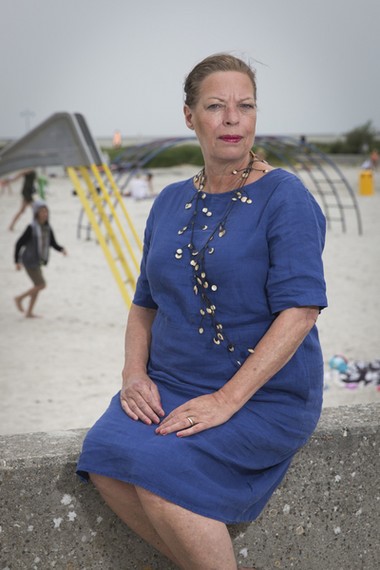Algemeen Dagblad, July 31, 2018
(unofficial translation)
Is Roelie Post a whistleblower, in Brussels, or not?
She brought out abuses in Romania, as an official at the European Commission. The Dutch House of Representatives now wonders: has Roelie Post been fired wrongly?

Post requested whistle-blower status. ©Dingena Mol
Hans van Soest
The 58-year-old Roelie Post is at her wit’s end. As a civil servant at the European Commission, you have fewer rights than ordinary citizens, ” she sighs. ‘Who is fired after a labour dispute and must then also repay salary of the last two years, under threat of a bailiff if not as soon as possible?’
Post is officially without a job as of Wednesday. This after years of internal conflicts at the European Commission where she worked for since 1983. As a civil servant she had, since 1999, to monitor compliance with children’s rights in Romania. There were abuses with Romanian children’s homes that needed to be resolved before the country could join the European Union. During her work Post came across abuses with adoptions of children abroad.
‘There were many excesses. Romania stood as a relatively small country in the top 4 countries with the highest number of children relinquished for adoption, compared to the rest of the world. Adoption agencies asked a lot of money from prospective parents. Children were offered for adoption because they supposedly were orphans, while parents were not at all dead. ”
Strong Lobby
When her political boss – the then European Commissioner Günter Verheugen -heard about it, he demanded of the Romanian Government that adoption abroad were stopped, if the country wanted EU membership. Much opposition came from other countries where many prospective parents were waiting for a Romanian child, such as France, Italy and the United States. Also Post’s direct official bosses worked against Verheugen. He then arranged that Post had to report directly to him, because he was afraid that her superiors misled him.
‘The lobby to continue adoptions was strong,’ says Post. In this period also the threats started. Anonymously, but Post suspects by people from the pro-adoption lobby. Romania abolished adoption abroad in 2004 and the country became a member of the EU three years later. But that did not stop the adoptions. Post: ‘There were still adoptions that were in the pipeline, these were allowed to continue. But there kept being children in the pipeline.’
But at work Post’s position got untenable when Verheugen was replaced. She was removed from her job, set aside. She has published a book about the abuses in Romania and the so-called adoption lobby. Within and outside Europe. That was not much welcomed. After mediation by the Secretary General, the highest official, it was proposed that she would set up a private NGO, while maintaining her EU salary: Against Child Trafficking – which tracked multiple abuses in adoption land, including in China and Ethiopia. Time and time again with orphaned children who proofed not to be orphans at all.
In 2014 her secondment stopped and Post had to go back to her workplace in Brussels. ‘But I was put in an office without decent work. Everyone ignored me. When I stepped into the elevator, senior officials stepped out. ‘To make matters worse the threats also began again’, she says. ‘I asked several times, in vain, to find me a proper job.’
The European Commission has a different reading. According to a spokesperson, for reason of confidentiality, it cannot address the reason of Post’s resignation.
However, a spokesperson refers to an investigation by the internal Ombudsman, which concluded in May of this year that the notice of dismissal was handled entirely in accordance with the rules. Correspondence shows that Post is accused of unauthorized absence because she no longer came to work.
Post says she felt so opposed that she called upon the European whistleblowing scheme, which protects officials who denounce abuses.
When that does not get honored, the rules prescribe that an official can then report to another European institution. “I wrote the President of the European Parliament and to Prime Minister Mark Rutte, who was then temporarily the chairman of the EU.” She says she did not receive a response.
In the meantime, the House of Representatives [Dutch Parliament] is also interfering. ‘I want to know how it is possible that this happens and no one answers’, says Christian Democratic Party Member Pieter Omtzigt. On earlier parliamentary questions from the Socialist Party (SP) in May this year, the government replied that it does not fully know about the case of Post. Omtzigt: ‘Was that letter from 2016 not even read?’’
Intimidating
SP Member of Parliament Renske Leijten calls it intimidating that Post must repay salary. ‘It is strange that the employer left it for so long and now sends a bill. I want to know from the cabinet how else she should have solved this. She was threatened, then what are good grounds for absence?’ Leijten wants the cabinet to mediate in the matter.
Post maintains that it is not right that she is not considered a whistleblower. ‘I am now being blamed for refusing to work,’ she says, ‘but I would like to work.’ My return turned out to be undesirable. ‘They do not want to be reminded of the past. And that now, in other countries, the same abuses occur as at the time in Romania.’